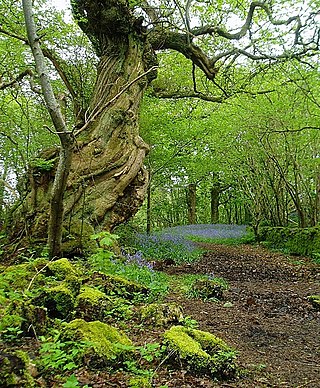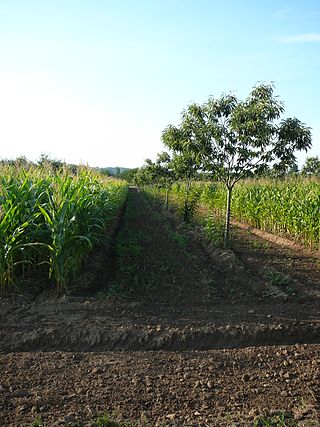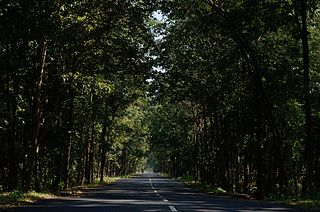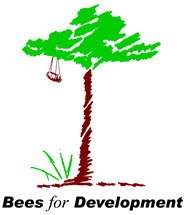Related Research Articles

Permaculture is an approach to land management and settlement design that adopts arrangements observed in flourishing natural ecosystems. It includes a set of design principles derived using whole-systems thinking. It applies these principles in fields such as regenerative agriculture, town planning, rewilding, and community resilience. The term was coined in 1978 by Bill Mollison and David Holmgren, who formulated the concept in opposition to modern industrialized methods, instead adopting a more traditional or "natural" approach to agriculture.

The Wildfowl & Wetlands Trust (WWT) is an international wildfowl and wetland conservation charity in the United Kingdom.

The Woodland Trust is the largest woodland conservation charity in the United Kingdom and is concerned with the creation, protection, and restoration of native woodland heritage. It has planted over 50 million trees since 1972.

Forest gardening is a low-maintenance, sustainable, plant-based food production and agroforestry system based on woodland ecosystems, incorporating fruit and nut trees, shrubs, herbs, vines and perennial vegetables which have yields directly useful to humans. Making use of companion planting, these can be intermixed to grow in a succession of layers to build a woodland habitat. Forest gardening is a prehistoric method of securing food in tropical areas. In the 1980s, Robert Hart coined the term "forest gardening" after adapting the principles and applying them to temperate climates.

The Chelsea Physic Garden was established as the Apothecaries' Garden in London, England, in 1673 by the Worshipful Society of Apothecaries to grow plants to be used as medicines. This four acre physic garden, the term here referring to the science of healing, is among the oldest botanical gardens in Britain, after the University of Oxford Botanic Garden. Its rock garden is the oldest in Europe devoted to alpine plants and Mediterranean plants. The largest fruiting olive tree in Britain is there, protected by the garden's heat-trapping high brick walls, along with what is doubtless the world's northernmost grapefruit growing outdoors. Jealously guarded during the tenure of the Worshipful Society of Apothecaries, the garden became a registered charity in 1983 and was opened to the general public for the first time.

In the United Kingdom, ancient woodland is that which has existed continuously since 1600 in England, Wales and Northern Ireland. Planting of woodland was uncommon before those dates, so a wood present in 1600 is likely to have developed naturally.

Agroforestry is a land use management system in which combinations of trees or shrubs are grown around or among crops or pastureland. Agroforestry combines agricultural and forestry technologies to create more diverse, productive, profitable, healthy, and sustainable land-use systems. There are many benefits to agroforestry such as increasing farm profitability. In addition, agroforestry helps to preserve and protect natural resources such as controlling soil erosions, creating habitat for the wildlife, and managing animal waste. Benefits also include increased biodiversity, improved soil structure and health, reduced erosion, and carbon sequestration.
Plants For A Future (PFAF) is an online not for profit resource for those interested in edible and useful plants, with a focus on temperate regions. Named after the phrase "plans for a future" as wordplay, the organization's emphasis is on perennial plants.
Bankside Open Spaces Trust (BOST) is a horticulture, gardening and management of urban open space charity, based in Bankside, the southern bank by the River Thames, Southwark, Central London, England. BOST works local communities and organisations in London, such as Tate Modern community garden, to improve, create and enjoy the parks, gardens, green spaces, and, passive and active recreation areas.

The jostaberry is a complex-cross fruit bush in the genus Ribes, involving three original species, the blackcurrant R. nigrum, the North American coastal black gooseberry R. divaricatum, and the European gooseberry R. uva-crispa. It is similar to Ribes × culverwellii, the jochelbeere, which is descended from just two of these species, R. nigrum and R. uva-crispa.
Martin Crawford is a British author who is the founder and director of the Agroforestry Research Trust.

Social forestry is the management and protection of forests and afforestation of barren and deforested lands with the purpose of helping environmental, social and rural development. The term social forestry was first used in 1976 by The National Commission on Agriculture, when the government of India aimed to reduce pressure on forests by planting trees on all unused and fallow lands. It was intended as a democratic approach to forest conservation and usage, maximizing land utilization for multiple purposes.
Forest farming is the cultivation of high-value specialty crops under a forest canopy that is intentionally modified or maintained to provide shade levels and habitat that favor growth and enhance production levels. Forest farming encompasses a range of cultivated systems from introducing plants into the understory of a timber stand to modifying forest stands to enhance the marketability and sustainable production of existing plants.

Botanic Gardens Conservation International (BGCI) is a plant conservation charity based in Kew, Surrey, England. It is a membership organisation, working with 800 botanic gardens in 118 countries, whose combined work forms the world's largest plant conservation network.

Trees for Cities is a UK charity which aims to plant urban trees and create greener cities. Since 1993, the organisation has reported that 125,000 volunteers have planted over 1,200,000 urban trees in parks, streets, woodlands, schools, hospitals and housing estates. The charity also runs the Edible Playgrounds programme, which aims to inspire school children to grow and eat healthy food.

Tree Aid is an international development non-governmental organisation which focuses on working with people in the Sahel region in Africa to tackle poverty and the effects of climate change by growing trees, improving people's incomes, and restoring and protecting land. It is a registered charity in the UK. Tree Aid has offices in Ouagadougou, Burkina Faso, in Mali, in Ethiopia, in Ghana, and in Bristol, United Kingdom. It currently has programmes running in Burkina Faso, Ethiopia, Ghana, Mali and Niger. Areas of Tree Aid's work include forest governance, natural resource management, food security and nutrition, and enterprise development. Tree Aid reported in their annual impact report 2019/20, that since 1987 it had grown 22 million trees, worked with 1.8 million people, and supported 36,350 people in enterprise groups.

Bees for Development is an international charity working to alleviate poverty through beekeeping. Beekeeping contributes to supporting sustainable livelihoods in poor and remote communities; honey bees provide an essential ecosystem service. Bees for Development currently runs projects in Uganda, Zanzibar, Ethiopia and Kyrgyzstan. Its offices are in Monmouth, South Wales.

Climate-friendly gardening is a form of gardening that can reduce emissions of greenhouse gases from gardens and encourage the absorption of carbon dioxide by soils and plants in order to aid the reduction of global warming. To be a climate-friendly gardener means considering both what happens in a garden and the materials brought into it and the impact they have on land use and climate. It can also include garden features or activities in the garden that help to reduce greenhouse gas emissions elsewhere.
Marsh Charitable Trust, also known as Marsh Christian Trust, is a national charity in the United Kingdom, based in London. It is a registered charity under English law, and was established in 1981 by Brian Marsh, the current Chairman. Marsh was appointed an OBE for services to business and charity in the 2005 New Year Honours.

Rubus tricolor is an evergreen prostrate shrub, native to southwestern China. Leaves are dark green above, pale green below, and stems have red bristles. It has white flowers in summer and edible red fruit. It grows approximately 0.3 m (0.98 ft) high and usually forming a vigorously spreading, dense mat. In cultivation, it is mainly used as groundcover. Common names include Chinese bramble, groundcover bramble, creeping bramble, Korean raspberry, Himalayan bramble, and groundcover raspberry. In Chinese, it is called 三色莓.
References
- ↑ "Agroforestry Research Trust, registered charity no. 1154161". Charity Commission for England and Wales.
- ↑ ", registered charity no. 1007440". Charity Commission for England and Wales.
- ↑ The Food Programme, BBC Radio 4
- ↑ A Farm for the Future - Natural world, BBC documentary
- ↑ Creating a Forest Garden: Working with Nature to Grow Edible Crops